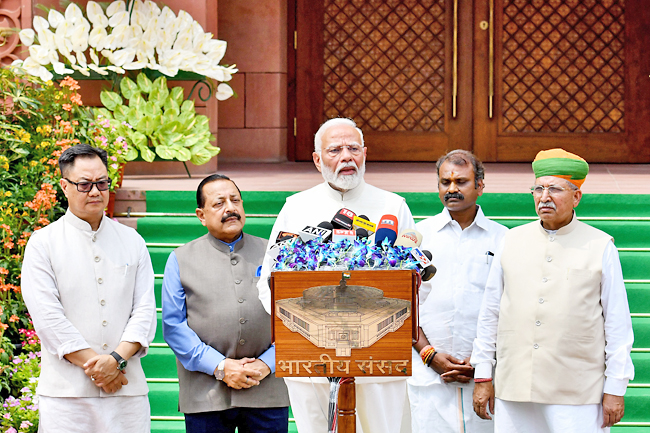NEW DELHI (AFP) – Indian lawmakers begin taking their oaths yesterday as Parliament opens after an election setback forced Prime Minister Narendra Modi into a coalition government for the first time in a decade.
Expected in the first session, which will run until July 3, is a preview of Modi’s plans for his third term and the likely formal appointment of Rahul Gandhi as leader of the opposition – a post vacant since 2014.
Modi’s first two terms in office followed landslide wins for his right-wing Bharatiya Janata Party (BJP), allowing his government to drive laws through parliament with only cursory debate.
But now analysts expect the 73-year-old Modi to moderate his agenda to assuage his coalition partners, focusing more on infrastructure, social welfare and economic reforms.
Minister of Parliamentary Affairs Kiren Rijiju yesterday called for a “peaceful and productive” session.
Rahul Gandhi, 54, defied analyst expectations to help his Congress party nearly double its Parliamentary numbers, its best result since Modi was swept to power a decade ago.
Gandhi is the scion of a dynasty that dominated Indian politics for decades and is the son, grandson and great-grandson of former prime ministers, beginning with independence leader Jawaharlal Nehru.
Parliamentary regulations require the opposition leader to come from a party that commands at least 10 percent of the lawmakers in the 543-seat lower house.
The post has been vacant for 10 years because two dismal election results for Congress – once India’s dominant party – left it short of that threshold.
The Parliamentary session will start with newly elected lawmakers taking their oaths over the first two days.
Modi has kept key posts unchanged in this government and the cabinet remains dominated by the BJP.
That includes BJP loyalists Rajnath Singh, Amit Shah, Nitin Gadkari, Nirmala Sitharaman and S Jaishankar – the defence, interior, transport, finance and foreign ministers, respectively, staying on in their jobs.




















































